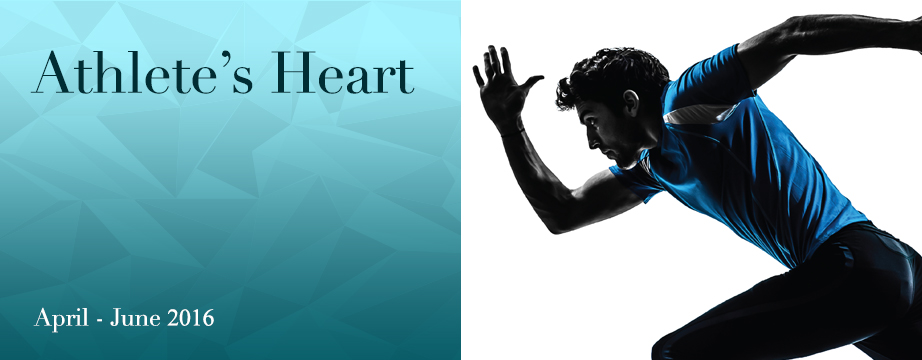
| Athletes who train regularly may develop a bigger heart. While this is a benign condition, overtraining could give rise to heart problems. |
| The term “Athlete’s Heart†is used to describe the changes that occur in the heart in order to adapt to the increased demands of training. |
| This process of adaptation is a gradual and continuous one, occurring over months to years. There is an increase in the size of the heart and the thickness of its walls. You could think of Athlete’s Heart as a normal heart but bigger. The extent and rate at which the changes take place are proportional to the amount and type of exercise performed by the athlete. Weightlifters develop more thickening of the heart muscles whereas marathon runners increase the volume of the heart without much increase in the thickness of the muscles. |
| Endurance cyclists and swimmers are similar to marathon runners. Their exercise is ‘aerobic’, meaning that the energy for their exercise is obtained from oxidation of carbohydrates, fats or proteins, in the presence of enough oxygen supply. In order to get enough oxygen, the amount of blood being pumped out with each heartbeat is increased so that more oxygen can be supplied to exercising muscles. Thus the volume of the heart increases much more than its thickness. In contrast, weightlifters work against increasing resistance as they lift heavier weights. They do not need to increase the volume of blood with each heartbeat but they need to work against higher resistance. Therefore, the thickness of the heart muscle expands to meet the increased stress. |
| Elite athletes also have lower heart rates than normal people who do not exercise, in the region of 35 to 50 beats a minute. They may also have changes on their electrocardiograms (ECG), which could be confused with the presence of heart disease. The types of heart disease that are often confused with “Athlete’s Heart†include cardiomyopathy, Sick Sinus Syndrome and heart block. Further investigations such as echocardiograms, Holter ECG, and cardiac MRI may be required to distinguish between these conditions. |
| Dangers of overtraining |
| Athlete’s Heart is not associated with any symptom. In fact, an athlete is at the peak of physical health due to training. If an athlete has symptoms such as chest pain, breathlessness, palpitations or blackouts, it usually indicates the presence of heart disease and not Athlete’s Heart. Therefore, he or she should consult a specialist to exclude the presence of heart disease. There has been recent data that reported permanent damage to the heart caused by overtraining. Overtraining can cause excessive enlargement of the heart, heart failure and increased deposition of calcium in the heart arteries. At an early stage the enlargement is reversible. |
| That is to say, if the athlete stops training, the heart could shrink back to a normal size. But there may be a point of no return when scarring has occurred and damage is permanent. |
| Sudden death syndrome |
| There have been cases reported of healthy young athletes suffering cardiac arrest in the middle of a game or practice. This, however, is not due to athlete’s heart; it is likely to have been caused by unrecognised congenital heart disease or genetically inherited heart rhythm disorders, which can be hard to diagnose. |
| Warning signs are often present. One is having dizzy spells or passing out during exercise. Next is a family history of sudden death. If you have a family history of heart disease, fainting or cardiac irregularities, get an ECG done. These tests are not foolproof, however. So if you experience shortness of breath, feel faint or have chest pain, stop exercising rather than push yourself to exhaustion. |
| If you are over 40 and planning to run your first marathon, you should undergo a stress test. You’ll run on a treadmill or go on a stationary bike to measure your heart rate and blood pressure while you perform increasingly difficult levels of exercise. A healthcare professional will be there to observe your ECG for changes while you exercise. Alternatively, you may have a nuclear or echo stress test that examines the blood flow to your heart. |
| Many athletes train while young and stop when they reach middle age. But they continue to eat as much as they did when they were training. As a result, they become overweight and develop problems associated with this, namely hypertension, diabetes, high blood cholesterol and heart disease. |
| My best advice to exercise enthusiasts is to treat it like any enjoyment, such as food and drink, or even medicine. Some exercise is essential to maintain good health. But if you overdo it, you will suffer from the effects of overdose! |
 DR RUTH KAM
DR RUTH KAMCardiologist
MBBS (Singapore)
MRCP (Int Med) (UK)
M Med (Int Med) (Singapore),
FAMS (Cardiology), FRCP (Edin)
Ruth Kam Heart and Arrhythmia Clinic
1 Farrer Park Station Road, #07-11 Connexion
Farrer Park Medical Centre, Singapore 217562
Tel: 6443 0468
www.arrhythmia.com.sg
1 Farrer Park Station Road, #07-11 Connexion
Farrer Park Medical Centre, Singapore 217562
Tel: 6443 0468
www.arrhythmia.com.sg



